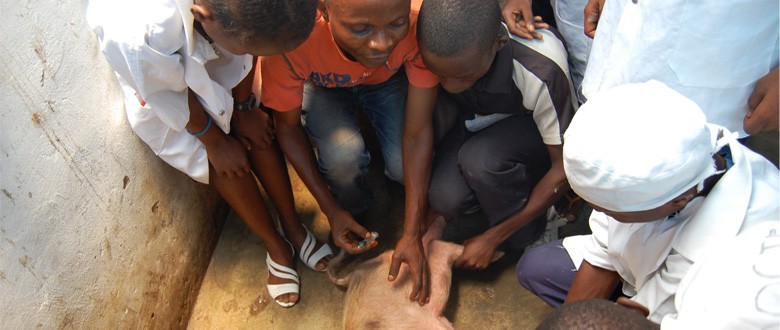
The DR Congo is in need of a skilled and entrepreneurial workforce to create wealth and emerge from poverty. Technical and Vocational Education and Training (TVET) must prepare learners for gainful employment and sustainable livelihoods. To that end, the Congolese government seeks to create a TVET strategy to identify key issues and develop strategic objectives for the next ten years. VVOB is supporting the Congolese government in the review of the current TVET system and the development of a TVET strategy for 2016-2025 by means of a consultancy financed by the Belgian government.
Developing the strategy
VVOB assisted representatives of seven ministries (Education, Health, Work, Technical and Vocational Education and Training, Culture-Sport-Youth, Social Affairs and Higher Education) in defining a common strategy for TVET comprised of four phases:
- Identification and formulation of strategic goals with the ministries
- Amendments and validation in focus groups with civil society actors (companies, trade unions, parents)
- Planning with experts of ministries of planning and budget
- Budgeting with experts of ministries
The strategy consists of three major points:
- Access and equity: developing a TVET system that is accessible, equitable and attractive which promotes growth and work
- Quality of formation: creating the conditions of a quality educational system
- Efficiency of the system: implement a transparent and efficient governance and piloting system
The strategy defines the priority actions for the next ten years. The assignment also resulted in an action plan to implement the strategy, including a budget estimate. The above are mobilisation instruments for all TVET stakeholders to achieve their common priority goals of an accessible, equitable, qualitative and efficient TVET system.
A “state of the art” of the present system
The strategy was determined as an answer to the difficulties and challenges raised in the review or factual basis on which the strategy was defined.
A first stage in the consultancy process was the review of the state of current knowledge about the TVET system (diagnosis). VVOB focused on data and literature that were previously available as well as interviews and focus groups with various stakeholders (ministries, colleges, employers, trade unions, parents) in 4 provinces (Kinshasa, Bas-Congo, Katanga and Kasai Occidental). Nearly 200 stakeholders on the national as well as provincial level contributed to the study, which focused on the formal, non-formal as well as informal components of TVET.
All key issues of the current system were raised:
- The connection between TVET and the productive matrix of the country
- Educational and career guidance
- Professional involvement (entrepreneurship, incubators)
- Teacher development and qualifications
- Infrastructure and pedagogical equipment
- Financing
- The piloting of the system (qualification framework, quality assurance, employer involvement, statistics, coordination mechanisms)




